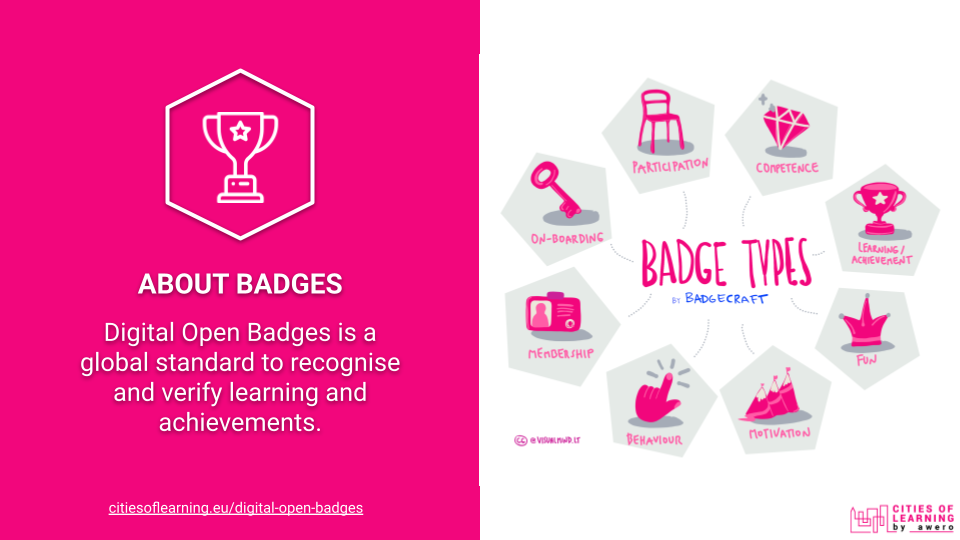10
Playlist TC Recognition of Non-formal Learning with Open Badges
Playlist TC Recognition of Non-formal Learning with Open Badges
Σχετικά
This Playlist represents your complete journey through the five essential stages of building a high-quality, trustworthy digital badge system. Over the past week, you moved from strategic vision to final implementation planning, mastering the principles of quality design (Quality Label for Badge Recognition), operational flow, and crucial policy foundation. Completing this Playlist confirms your ability to design, launch, and sustain a credible badge system in the global learning ecosystem.
Εκκρεμείς δραστηριότητες
Ολοκληρώστε τις παρακάτω δραστηριότητες, κερδίστε σήματα και θα δείτε την πρόοδο της playlist σας να ενημερώνεται
Σχετικά
Today, we moved from the strategic 'why' of badging to the practical 'what' and 'how.' We explored real-world examples, analyse different types of badges, and use the DPD cards to talk about what is important to add in a badge description.
Exploring real-life badges and badge systems
We began with a tour of the badge landscape, rotating through stations to examine several real-life recognition systems in action.
This hands-on rotation showed us how badges are used in practice. At each presentation of a real-life example, you analysed the system's objective, the sector it operates in, and the visual look of the badge and its criteria. This gave us a practical look at how diverse contexts require tailored approaches.
Defining objectives and types
Next, we focused on the badge types and their objectives.

In groups, you analysed four badge descriptions—including the ESC Volunteer Badge, the ESC Mentors Badge, the Conference Participation Badge, and the Youth Exchange Behaviour Badge—to determine their type (e.g., participation, competence, behaviour) and their specific organisational objective.
We highlighted the insight that ambiguity exists: many badges serve multiple purposes (e.g., a participation badge that is also a condition for a learning achievement).
The DPD Check
We concluded the session by introducing the DPD (Design Principles) cards—our tool for checking a system from the start. You took the four badge types from the previous session and used the DPD cards to discuss which design objectives best align with each badge. This challenged you to think about recognition, assessment, motivation, and researching a badge in a holistic way.
The journey begins
You started to work on building persona's and badge journey's by defining your target group and designing a learning journey.
You can find more information and how to build a learning journey in the activity Creating quality Open Badges and badge systems.
Individual and group reflection
We concluded the day with a moment for both individual and group reflection, focusing reflecting:
- Your feelings about the day
- Your takeaways of the day
- Your feedback about the day to others
Next Up
Tomorrow, Day 3: Quality in Badging, we will focus on Quality criteria of Quality badges, Building quality badges and Issuing badges.
Υλικό
- 12 Good Practices of Badge Systems - Badges4Good
- EBA publication Value and Recognise learning during international mobility with Open Badges
- ETS Badges for Youth Workers
- Mozilla Promising Practices Reports
- Trusted Badge Systems
- Unique Learning Badges
- ExpeditieRED Dutch National Volunteering - Maatschappelijke Diensttijd
- SWOT it UP - practice from Curacao Island of Learning - TAO Curacao BV
Αποκτήστε το σήμα δραστηριότητας
Badge Architect Αποκτήστε αυτό το σήμα
This badge is awarded for successfully defining the core elements of an Open Badge and an Open Badge system. The earner has established a foundation in understanding badge types and objectives by using the the DPD Framework (Recognising, Assessing, Motivating, Studying). This signifies readiness to begin drafting precise criteria.
To earn this badge, the participant must have:
- Actively participated in the real life badge and badge-system examples and the DPD card analysis exercises.
- Made progress on defining the Persona, Objectives, and Badge Types for a practical badge idea.
- Successfully completed the structured individual reflection of day 3.
- Attended the full Day 2 programme.
The course trainers Sandra Zoomers and Laimonas Ragauskas, both certified to deliver Quality Open Badge training by the Cities of Learning Network, confirm the attendance, active participation and reflection of day 1 of the training ‘Recognition of Non-formal Learning with Quality Open Badges. The training course is supported by the EU programme Erasmus+ and organised by the Network of Cities of Learning.
Εργασίες
Αρ. Εργασίας 1
Εκδίδεται από τον οργανωτή ή σάρωση κώδικα QR
To deepen your learning, think and report on the following:
Feelings. How do I feel about the day?
Findings: What do I take from the day?
Feedback: What feedback would I like to give to other peer learners and organisers?
Τοποθεσία
Lüttgen-Ottersleben 18A, 39116 Magdeburg, Germany
Badge Design Practice
Προαιρετικό
1 ώρα 30 λεπτά
You need an invite to view this activity
Δεξιότητες
ETS-TR
#Μάθηση με και από τους άλλους
ESCO
#production of badges
Δραστηριότητες: 9
Ξεκίνησε: 13
Η playlist ολοκληρώθηκε: 4
Ώρα για να ολοκληρωθεί: 10 ώρες 30 λεπτά
Κοινοποίηση:
Διοργανωτές
Cities of Learning Network
Badge issuer recognized with
Αλλαγή γλώσσας:

